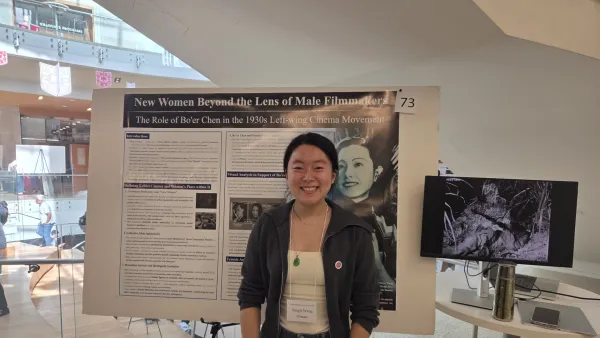FMS Major Tina Chen ('21) successfully completed and defended her honors thesis this spring. We talked to Tina about her research and its significance.
Congrats on your accomplishments, Tina!
Please tell us about your thesis, "Building the Idol Assembly System: Modern Masculinity Examined through the Lens of Chinese Media Industries."

What was the inspiration for your thesis?
I’ve been immersed in East Asian media content for a long time and this “Little Fresh Meat” concept is possibly the most fascinating and controversial phenomenon that I’ve seen. Despite some audience members openly expressing their distaste, idols’ fan bases are still expanding faster than ever. Some people claim that it’s just a fad that would die down soon, but I wanted to dig into its roots because any changes in media culture reflect shifts in audience behaviors and transformations of social values.
What did your research involve?
The majority of my thesis consists of primary research such as my observations of films and TVs that idols star in. Because I’m tackling issues that are relatively new, I wanted to include many of my own arguments. There are also topics that former scholars have touched on and I wish to approach differently, which makes a combination of primary and secondary research very important. In addition, it is the nature of idol culture to extend its influence beyond films and TV shows. I conducted research in music videos, social media platforms, and especially fan forums because these are places where fans express their opinions most directly and as I have discussed, fans’ voices are crucial in idol cultural trends.
What is the significance of this project?
Referring to concepts from several western theorists, I first wish to decouple phenomena such as queer theory from their Euro-centric standpoints. When we look at androgynous representation, it’s tempting to compare it to drag culture and assume that it’s a form of sexual liberation, when it might not be so simple, as we need to take the unique media context into account. I also highlight the idea of an active spectator that does not merely receive what is being fed to them. Analyzing media trends, especially those that are popular among the younger audience, such as idols’ personas, helps us understand the changing social values of a specific group. For example, as I have discussed in my thesis, the idols’ representation of masculinity, in fact, can reinforce heteronormativity and in turn, direct attention away from queer liberation. On the other hand, though, it also leads to female empowerment to some extent in the form of female gaze.
Do you have any suggestions for further reading on this topic?
My discussion centers around male idols in the Chinese media context with brief discussions on its Korean influence, but part of what interested me about the topic in the first place is how it is found in different forms across East Asia. If you are interested in more in-depth discussions on idol culture and masculine representation in Japan, for example, I would recommend reading articles from Fabienne Darling-Wolf and Emma Furbo-Vig. They talk about masculine representation in Japanese media, while also placing it in contrast to the female spectator.



